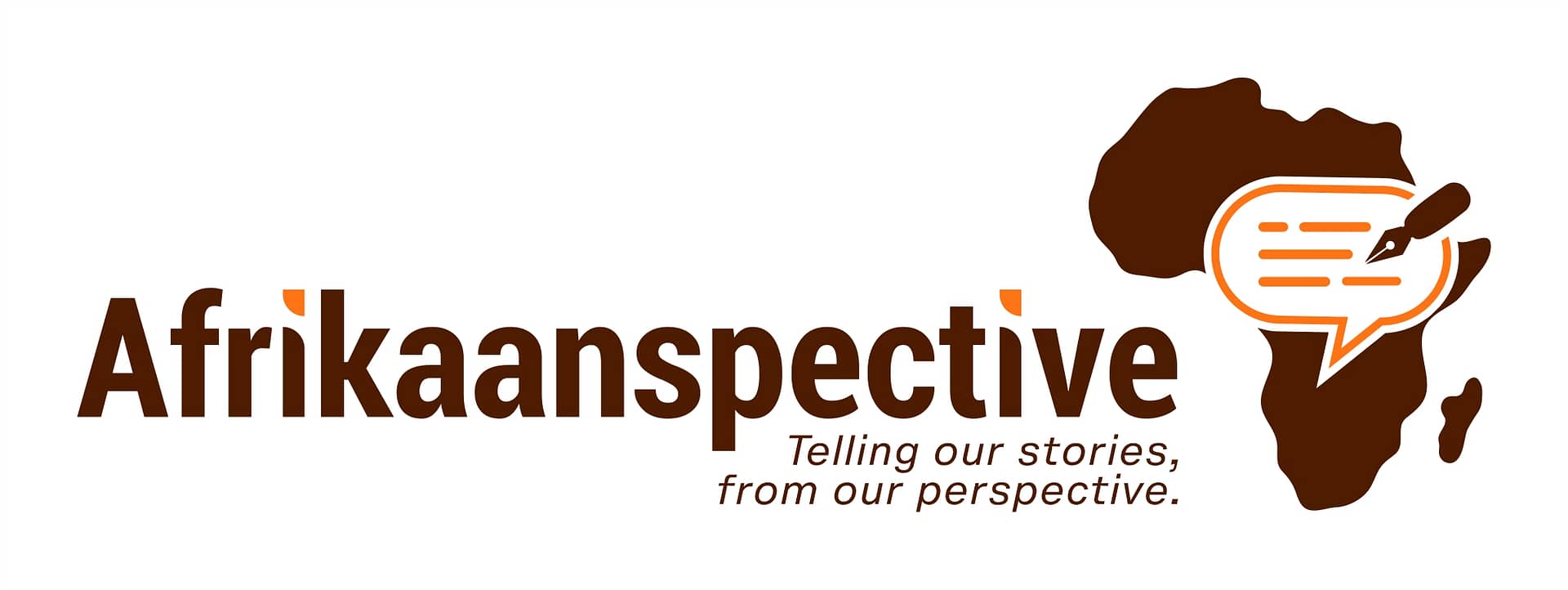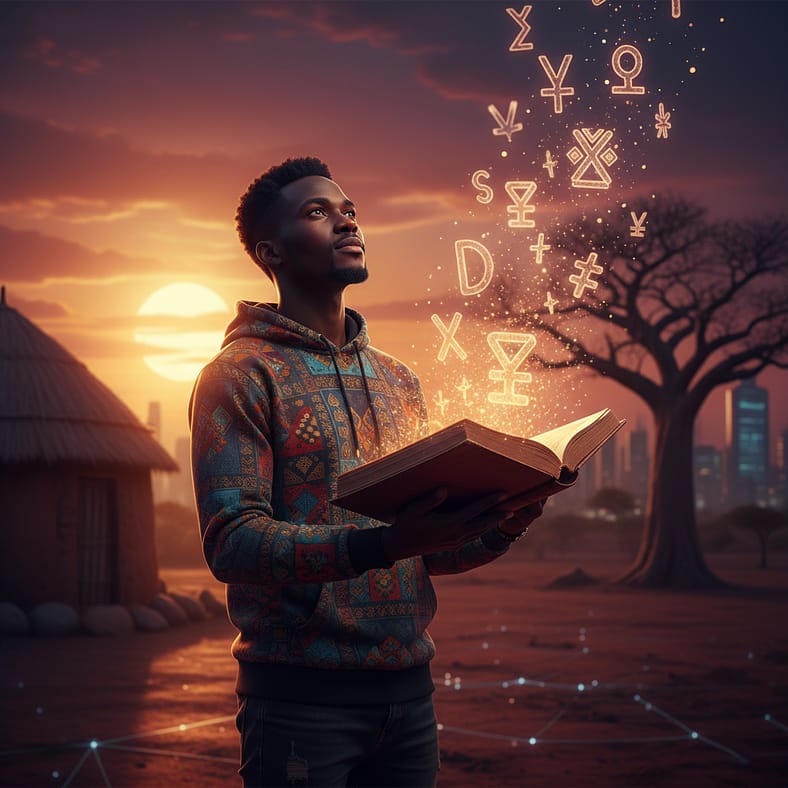The boy had a name his grandmother could not pronounce.
Her tongue was not too old or slow; it simply could not carry a rhythm she recognized. The name, sleek and foreign, lacked root and dust. It floated in the air like imported perfume, sweet but without story.
Perhaps that is how forgetting begins, not with noise or violence, but through silence. It begins with the quiet erasing of home from our mouths.
Over time, between airports and algorithm-curated timelines, many of us began to let go of our true names. We started trading “Mama mi” for “Mum,” “Nne m” for “Mother,” “Aboki na” for “My friend,” “Mama Afrika” for “Queen Mother,” and “nyama ye ngulube” for “pork.” In doing so, a thousand years of African memory loosened its grip, little by little.

The Modern Drift
It is not a betrayal; it is a drift.
Slowly, we move away from the voices that once wrapped us in lullabies before we even knew what words meant. This gradual forgetting does not come from shame but from survival. English pays, French promotes, Portuguese opens doors, and Arabic connects trade.
Across classrooms from Lagos to Lusaka and from Nairobi to Niamey, teachers correct children for speaking Yoruba, Swahili, Zulu, Igbo, Hausa, or Kikuyu. “Stop speaking vernacular,” they say. In many offices, our mother tongues are whispered jokes rather than languages of pride. Even at weddings, the talking drummer now competes with DJs shouting “Let’s go!” over amapiano beats.
Meanwhile, we scroll through our screens and speak in borrowed slang. Our greetings sound like code, and our thoughts are colonized by trends.
However, this is not a fight against modernity. Africa is not a museum. We are not relics to be preserved in glass boxes. We move, we evolve, and we innovate.
Still, as the Yoruba say, “Odò tó bá gbàgbé orísun rẹ, gbígbẹ ló máa gbẹ” — A river that forgets its source will dry up.
Languages as Inheritance
When a language dies, it does not vanish; it becomes quiet in the mouths of its children.
According to UNESCO, more than 2,000 African languages are spoken across the continent. However, many of them are now endangered. Some survive only in small corners, spoken by elders whose children have replaced words with French phrases or WhatsApp emojis.
Moreover, when language disappears, the stories vanish too. The idioms fade. The jokes lose their rhythm. Think of the way your Igbo auntie calls you “Nwa m” with a tenderness that English can never hold. Remember how your Hausa uncle blesses you with “Allah ya taimake ka,” meaning “May God help you.” Recall your Zulu grandmother greeting you with “Sawubona,” meaning “I see you,” or your Swahili friend saying “Karibu” and suddenly you feel at home.
Because language is not only for speaking; it is also for knowing, for feeling, and for remembering. It shapes our identity and connects us to generations before us.
A Yoruba proverb reminds us, “Òwe l’ẹṣin ọ̀rọ̀, bí ọ̀rọ̀ bá sọnù, òwe la fi ń wá a.” Proverbs are the horses of speech; when words are lost, we ride on proverbs to find them.
Likewise, an Igbo elder would say, “Asụsụ bụ ndụ,” which means “Language is life.”
Therefore, we do not merely speak African languages; we live within them. They breathe through us, carrying our stories, emotions, and truths into tomorrow.
A Return, Not a Rejection
There is beauty in blending. In diasporas that cook okra with quinoa. In poems that mix Yoruba and English. In weddings where grooms wear agbadas over sneakers, or brides mix kente with lace.
Modern Africa is layered. We are both rooted and reaching.
But we must reach back too.
Because African culture is not a costume you wear on Heritage Day. It is not something you fetch when the president says “dress traditional.” It is not an Instagram post of your grandmother’s hut.
It is daily.
It is in the way you kneel or bow to greet your elders. It is in the way you dance when the talking drum calls your name. It is in how you teach your child to say “Ẹ ṣé,” “Daalu,” “Asante,” “Nagode” before they say “thank you.”
Culture is active remembering.
And so, we remember. We remember by naming our children words with soul; Ayomide, Chukwudi, Kwame, Aisha, Naledi, Tendai. We remember by singing lullabies that smell like firewood and palm oil stew. We remember by teaching our friends what Ubuntu means, not just how it sounds.
The Digital Dilemma
There is no doubt that the digital world is reshaping our identity and influencing how we express who we are.
Across social platforms, TikTok trends quietly erase dialects, while Spotify algorithms often promote American beats over talking drums and balafon rhythms. Even autocorrect seems to resist our names, treating them as mistakes. When you type Adéọlá, Chiamaka, or Thandolwethu, your phone politely offers to “fix” you.
However, in the same digital spaces where forgetting thrives, remembering can also rise. We now see it in young creators rapping in Yoruba, Swahili, and Lingala. It lives in Instagram pages that teach proverbs in isiZulu and Shona, and in podcasts that record the oral histories our grandparents never wrote down.
More importantly, it shines through platforms such as The Masaoyinbo Show on YouTube, created by EAYoruba — a name that translates to “Èdè àti Àṣà Yorùbá,” meaning Language and Culture of the Yoruba. The show celebrates indigenous expression, teaching Yoruba language, heritage, and traditions to a global audience.
Through such examples, technology becomes more than a threat; it becomes a bridge. It can document culture, revive what classrooms have long ignored, and make our African languages go viral, not as curiosities, but as carriers of identity.
Therefore, we do not have to choose between the modern and the ancestral. What we must do is learn to balance the drumbeat.
Voices from the Ground
As Mama Thandi Mhlongo, a Xhosa teacher from Mthatha, once said:
“I am not afraid of English. I just refuse to forget how my mother prayed.”
It is not about banning English. It is about making sure Yoruba, Swahili, Zulu, Igbo, Hausa, Amharic, Edo, Twi, and Shona still echo across generations.
Because every time we switch tongues without remembering our own, we hang our history in a wardrobe. Neatly folded, yes, but unworn.
The Call to Remember
Africa does not need saving. She needs remembering.
Not just in documentaries or dusty books. But in kitchens. In WhatsApp groups. In playgrounds. In how we greet the morning — Ẹ káàárọ̀ o, Ụtụtụ ọma, Ina kwana, Karibu, Sawubona. And in how we console the broken — Ẹ má binu, ndo, pole sana, sannu da aiki.
Culture is not what we had. It is what we keep.
And so, let us wear our names with pride. Let us dance in patterns our ancestors would recognise. Let us speak in voices that sound like home.
Let us remember, before we forget where we came from.
Because Africa’s story is not told, it is lived. And as we say across the continent, “He who does not know his father’s story will repeat his father’s mistakes.



